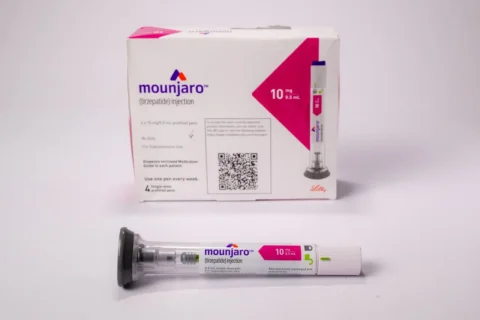What you’ll learn
You’ll get a clear overview of how Ozempic® works, common side effects you might notice (and a few rare ones to be aware of), and simple, practical tips to help you feel more comfortable as you move toward your health goals.
If you’ve been considering taking medication to aid your weight loss efforts, one of the most common names you’ve heard is Ozempic®. Ozempic (semaglutide) has shown a promising weight loss potential, but like any medication, it may have side effects, most of which affect the digestive system. The good news is that most common Ozempic side effects are mild and diminish over time as your body adjusts to the medication.
Whether you’re considering this treatment or just starting it now, understanding what side effects you might see and how to manage them can help you stay more comfortable and confident on your weight loss journey.
What is Ozempic?
Before we dig into side effects, it’s helpful to first understand more about Ozempic and how it works.
Ozempic is the brand name for semaglutide, a medication originally approved to help people with Type 2 diabetes manage blood sugar. It belongs to a class called GLP‑1 receptor agonists. These medications mimic a hormone called glucagon-like peptide-1 (GLP‑1) that plays a key role in regulating your blood sugar and metabolism.
What does that mean in practice?
- They help your pancreas release insulin when needed
- They slow digestion slightly, which can reduce appetite
- You may feel fuller longer and eat less
That’s why semaglutide is now also used off‑label or in related formulations for weight management.
Ozempic side effects
Like any medication, Ozempic has side effects. In many cases, these side effects can be managed, and the weight loss benefits can outweigh the temporary discomfort. Ultimately, it’s up to you to decide. To make the right call, it’s important to have an honest discussion with your provider based on your personal and family medical history, and where you’re at now. For instance, if you’re pregnant or trying to get pregnant in the near future, it’s not recommended that you take Ozempic during pregnancy.
Some side effects are common and manageable. Others are rare but important to watch for. Many people find that the side effects are strongest when they first begin the medication and then taper off. You may quickly adjust to the GLP-1 side effects as you continue taking the medication, but it can still help to know what to expect.
Most common
Some side effects are more frequently reported, especially when people first start taking Ozempic. Knowing what triggers them and how to reduce their impact can help you better understand what’s going on and stick with your medication.
Nausea and vomiting
You know it when you feel it: that queasy, unsettled feeling in your stomach that sometimes results in actual vomiting. This side effect can occur especially after meals or when taking a higher dose. Ozempic can heighten these symptoms by slowing digestion and amplifying fullness signals. You can reduce these feelings by eating slowly and avoiding fried, greasy, or sweet foods. Another technique is to stop eating when you feel about 80% full, and try calming options like ginger tea or bland, easy-to-digest foods (like rice, toast, or bananas). If you continue to feel nauseous, your provider may recommend adjusting your dose or timing.
Constipation
You might notice fewer bowel movements, hard or dry stools, bloating, or that uncomfortable “backed-up” feeling. Ozempic slows down how quickly food moves through your digestive system, which can also slow bowel movements. This is especially true if you’re not drinking enough water or eating enough fiber. Stay well-hydrated, add more fiber-rich foods (like berries, beans, or oats), and move your body with gentle walks. If things still feel sluggish, talk to your provider about adding a stool softener or fiber supplement.
Diarrhea
Another commonly reported side effect of Ozempic is loose or watery stools that may come on quickly or repeatedly throughout the day. You might also feel mild cramping. This is normal when you first start Ozempic or increase your dose due to how the medication changes how your body absorbs nutrients and digests food. To ease these effects, eat smaller, more frequent meals and avoid greasy or overly rich foods. Staying hydrated is key, especially with fluids that have electrolytes.
Indigestion
You might experience a heavy, uncomfortable feeling in your upper stomach after eating. It may come with bloating, slight nausea, or a feeling of fullness that lingers.
Eating too quickly, large meals, high-fat or spicy foods, or lying down soon after eating can be a trigger. Ozempic slows digestion, so food sits in your stomach longer, which can worsen this. Try smaller, more frequent meals and eat slowly. Stick with lighter foods that are easier to digest, and wait at least 1–2 hours after eating before lying down.
Acid reflux
Sometimes called heartburn, you might feel a burning sensation in your chest or throat that can worsen when you lie down or bend over. This is a result of your stomach emptying more slowly when taking Ozempic, which can allow acid to rise more easily. Avoid greasy or acidic foods, eat earlier in the evening, and stay upright for a few hours after eating to help ward off acid reflux.
Flatulence (gas)
This side effect can be embarrassing or uncomfortable, especially after meals. You might feel pressure in your belly or find yourself excessively passing gas. This happens due to Ozempic’s ability to slow your digestion. As a result, it allows for more fermentation in the gut. You can lessen this side effect by introducing fiber-rich foods gradually after you start on Ozempic. Avoid carbonated drinks and limit artificial sweeteners. Taking a walk after meals may also help stimulate digestion and move gas along.
Burping
Another embarrassing side effect. You might find yourself frequently belching. Your burps might also be accompanied by a sour taste if acid reflux is present, too. This is triggered by swallowing air while eating or drinking too fast. To feel less gassy, eat slowly, avoid carbonated drinks and chewing gum, and skip drinking through a straw. Ginger tea or a bit of warm lemon water can help ease the buildup of air in the stomach.
Less common
Other less common side effects include:
Unusual hunger
Some people taking Ozempic notice swings in hunger signals, especially as their body adjusts to the medication. You might feel unusually hungry, as your appetite triggers can be affected by the medication. It can take a few days for the medication to build up in your body enough to get the appetite-suppressing results you want. These appetite fluctuations usually stabilize.
Severe diarrhea
In rare cases, nausea or diarrhea may become intense, leading to stomach pain, dehydration, or electrolyte disturbances. You might even experience stomach pains and chills. If symptoms worsen or persist, that’s a red flag to contact your provider.
Bloating
Feeling bloated or overly full is a relatively minor side effect and is usually tied to how Ozempic slows digestion. While uncomfortable, it typically improves as your body adjusts. If it’s severe or painful, talk to your provider about possible food triggers or timing adjustments.
Low blood sugar (hypoglycemia)
This is more likely if you’re also using other glucose‑lowering medications. Symptoms can include:
- Dizziness
- Blurred vision
- Pale skin
- Clumsiness or feeling shaky
- Sweating
- Confusion
Make sure to eat regularly and monitor these symptoms closely. If you feel faint, confused, or unsteady on your feet, seek medical attention immediately.
Abdominal pain that extends to the back
Pain that radiates from your stomach to your back can also be linked to pancreatitis, or, less commonly, gallbladder problems. This symptom deserves urgent evaluation, especially if it doesn’t go away or worsens.
Fever
A low-grade fever could stem from a minor illness, but if it happens alongside nausea, vomiting, abdominal pain, or fatigue, it may be tied to pancreatitis or an infection. If fever is persistent or paired with other GI symptoms, call your provider promptly.
Allergic reactions / swelling:
Some people may develop swelling in the face, lips, feet, or throat, or have difficulty breathing. These warrant immediate medical attention.
Rash, redness, or itching
You might notice mild redness, swelling, or itching at the injection site. This usually goes away on its own. However, widespread rash, hives, or facial swelling can indicate an allergic reaction. If you experience difficulty breathing or have swelling in the face or throat or a spreading rash, this is a medical emergency, and you should call 911.
Severe side effects to watch out for
While it’s normal to experience side effects with any new medication you start, there are some side effects that are not normal. These severe side effects of Ozempic are rare, but it’s important to know when to take immediate action.
Pancreatitis
Severe stomach pain that comes on suddenly and may extend to your back can be a sign of pancreatitis, a rare but serious side effect of GLP-1 medications. You may also feel nauseated or vomit frequently. If you feel sharp, persistent upper abdominal pain (especially with vomiting or fever), seek emergency care right away.
Kidney issues
Because nausea, vomiting, or diarrhea can lead to dehydration, there’s a risk of kidney injury if fluids aren’t replaced. Stay hydrated and report any unusual swelling or changes in urination.
Thyroid issues
Ozempic carries a boxed warning about the risk of thyroid C-cell tumors in rodents. It’s not confirmed whether this applies to humans, but people with a personal or family history of specific cancers, including thyroid cancers, should consult with a provider first before using Ozempic.
If you notice any side effects while using Ozempic, it’s crucial to report them to your medical provider before your next dose. This proactive step can help ensure your health and safety during your weight loss journey. You should also report Ozempic safety or side effect issues to the FDA by visiting www.fda.gov/medwatch or calling 1-800-FDA-1088.
In an emergency, call 911 for assistance or go directly to your nearest ER.
Long-term vs. short-term side effects
So, how long do Ozempic side effects last? Some only last until your body gets used to the medication, while long-term Ozempic side effects could linger for months.
Short-term side effects (nausea, loose stools, fullness) often improve as your body attunes, typically within a few weeks.
Longer-term effects depend on dose, duration, and individual factors. Some side effects may linger or emerge later, like gallbladder issues, changes in kidney function, or concerns associated with the medication’s thyroid warning.
Ozempic side effects in males vs. females
When you’re managing side effects, it can help to understand whether your gender might influence what you experience. But it’s equally important to know that, in many cases, side effects depend more on dose, health status, genetics, and how your body attunes to the medication than gender alone.
| Ozempic side effects in males | Ozempic side effects in females |
| Indigestion | Nausea |
| Constipation | Constipation |
| Low blood sugar | Low blood sugar |
| Fatigue | Dizziness |
| Heartburn | Heartburn |
| Vomiting | |
| Diarrhea | |
| Blurred vision |
Everyone’s body responds a little differently to treatment. Your personal experience matters. If you’re having a tough time with side effects, you’re not alone.
Ozempic side effects in men
Men tend to report gastrointestinal effects like:
- Indigestion
- Nausea
- Fatigue
- Occasional low blood sugar
- Heartburn.
Some clinical and real‑world data suggest that, overall, side effects occur less frequently or with less severity in men than women for GLP‑1 drugs. For example, one review paper notes that in preclinical and some clinical settings, the side effects tend to be less intense in men than in women.
Ozempic side effects in females
Women taking Ozempic might experience:
- Diarrhea
- Vomiting
- Dizziness
- Blurred vision
- Low blood sugar
- Nausea
- Constipation
Some studies show that women are more likely to discontinue treatment because of these side effects. It’s important to note that very few trials are designed to specifically test how side effects differ between men and women taking the medication.
From what we do know, researchers have found that women may have more of something called GLP‑1 receptors in the parts of the brain that make you feel sick to your stomach. These receptors act like “docking stations” for the medication. When more of them are activated, it can lead to stronger feelings of nausea or queasiness.
Also, when women take GLP‑1 medications like Ozempic, the amount of medicine that stays in their blood tends to be higher than it is for men, even when they weigh the same. That means their bodies may feel stronger effects from the same dose, which could explain why some women experience more side effects.
How to manage side effects from Ozempic
It’s perfectly normal to experience side effects with Ozempic. Symptoms for most people usually get better over time. Your body is adjusting to something new. Here’s how you can give it a little extra support:
- Talk with your provider. If any symptoms feel like they’re too much for you, adjusting the dose or timing may help. Your provider is there to listen and make any adjustments needed to help you feel better and continue on your weight loss journey.
- Stay hydrated. Be sure to drink plenty of water. This is especially important if you experience vomiting or diarrhea, to replenish any lost fluids and electrolytes.
- Choose gentle foods. Bland, easy-to-digest meals can reduce nausea or upset stomach.
- Limit known triggers. Spicy or fatty foods may worsen side effects.
- Keep track of your symptoms. Write down the time, severity, and what you were doing when your symptoms hit. This will help your provider fine-tune your plan.
Side effects are a normal part of many medication journeys. With open communication, small adjustments, and flexibility, many people find that the benefits outweigh any downsides.
If you ever feel unsure, notice severe symptoms, or wonder whether this medication is still right for you, don’t wait. Our providers are ready to speak with you, adjust your plan, and support you along the way.
Interested in Ozempic for weight loss?
If Ozempic is right for you, we can make getting started simple. With a QuickMD telemedicine visit, you can talk to a licensed provider about your weight loss options without leaving home. It’s private, convenient, and designed to give you more control over your health, on your schedule.
Get professional advice with QuickMD
Thinking about Ozempic for weight loss? Our telemedicine providers are here to help you understand how it works, what side effects to expect, and whether it’s the right choice for you. If it’s a good fit, we can prescribe Ozempic for you safely and conveniently, all online.
Frequently asked questions
What organ does Ozempic affect?
Ozempic mostly works on your digestive system, especially your stomach and intestines. The medication works by slowing down how quickly food moves through. It can also affect other organs like your pancreas, kidneys, thyroid, and gallbladder, which is why regular check-ins with your provider are important.
How long can you stay on Ozempic?
There’s no official time limit. You can stay on Ozempic as long as it’s helping and your provider agrees it’s safe for you. Some people use it short-term, while others stay on it longer to help manage weight or blood sugar.
Will you gain weight after stopping Ozempic?
It’s possible that you might regain some weight after stopping. That’s why it’s important to make a long-term plan for eating well, staying active, and managing cravings. With the right support, it’s possible to maintain the progress you’ve made, even after you’ve stopped the medication.
Who cannot take Ozempic?
Ozempic might not be the right fit for everyone. If you’re pregnant, breastfeeding, or have a personal or family history of certain thyroid cancers, Ozempic might not be the right weight loss solution for you. Have an open, honest conversation with your provider. This can help you both decide if Ozempic is the right fit for you and, if not, understand other options available to you.
Is Ozempic hard on your body?
Most people do well on Ozempic, but some experience side effects, particularly in the first few weeks. This is normal as your body is going through an adjustment period with the medication. If anything feels off, your provider can help adjust your dose or recommend other ways to ease side effects.
What is the new warning on Ozempic?
The FDA recently added a warning about a rare but serious condition called ileus, a type of intestinal blockage. It doesn’t happen often, but it’s something your provider will watch for, especially if you’re having stomach pain, bloating, or trouble going to the bathroom.




